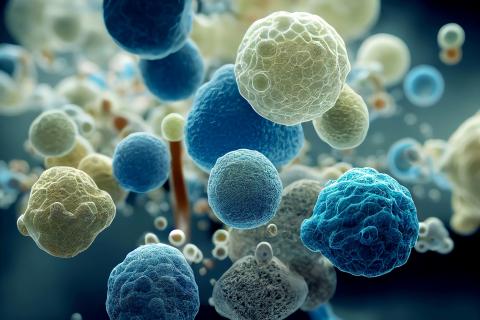Reactions: Myths and exaggerations about the microbiome harm your research, an article warns
An opinion piece signed by researchers from the Universities of Aberdeen and Nottingham (UK) has outlined some of the inaccuracies, exaggerations and misconceptions they say are taking place around research on the human microbiome. Some of these are curiosities, like the false belief that we have ten bacteria for every human cell. Others are more relevant, such as the fact that many specific associations between the microbiome and disease have not been confirmed in follow-up studies. According to the authors, it is important to raise awareness about myths and misconceptions to avoid unproductive research projects and preserve public confidence in microbiome science. The article is published in the journal Nature Microbiology.

Toni Gabaldón - mitos microbioma EN
Toni Gabaldón
ICREA research professor and head of the Comparative Genomics group at the Institute for Research in Biomedicine (IRB Barcelona) and the Barcelona Supercomputing Center (BSC-CNS).
I agree with all the authors' assessments and I think it is always important to clarify terms and concepts. Perhaps the text suggests that everyone believes in these myths and that the authors reveal something surprising to us. I think that in reality the field is already (for the most part) aware of everything that is said here, but that these myths continue to reach experts in other areas or the general public, leading to confusion.
The field of microbiome study (like other rapidly expanding fields) suffers from the existence of dogmas and simplifications assumed early on based on very limited information and that we have to correct and modulate as we learn more. One of the most important qualities of science is its ability to self-correct.
Rob Knight - mitos microbioma EN
Rob Knight
Director of the Microbiome Innovation Center and Professor at the University of California, San Diego (United States)
This article makes many good points. I would say that most or all of them are already well appreciated by experts in the field already, but it is useful to have them summarized in one place especially because so many people are joining the field at the moment.
The lack of replication of microbiome associations with disease is an important topic but is more nuanced than described in the article. To be useful as a clinical test, a microbe or microbiome pattern doesn’t have to cause the disease, but just act as an accurate marker for the disease. Additionally, we think it really is true that some of the markers are different in different populations, but real for each population individually. This is just like how the same drug can be more effective for one group of people than another — it doesn’t mean you shouldn’t use the drug, but it does mean you should find out who it works for rather than giving it to everyone.
Mireia vallés-Colomer - mirobioma hype
Mireia Valles-Colomer
Head of the Microbiome Research Group, Department of Medicine and Life Sciences, Pompeu Fabra University
In this perspective, Alan Walker and Lesley Hoyles write about erroneous but still recurring data in the field of the human microbiome. Like other rapidly developing fields of research, and one that is also of great interest to the general public, the most accurate data are not always used when discussing the microbiome. A typical example is the ratio of bacterial to human cells, which had been estimated at 10:1 in the 1970s and was more accurately calculated at approximately 1:1 in 2016, but the updated data is often not used. Others are historical acknowledgements of research preceding the development of massive sequencing techniques or about who first used the term 'microbiome'. Such articles do not provide new results, but they can help the field move forward more precisely and focus efforts on priority research questions.
Michael Woodworth - microbioma hype
Michael Woodworth
Researcher in microbial therapeutics, Associate Professor of Medicine, Emory University School of Medicine.
Many of these myths have been highlighted by prior authors but it is useful to consolidate them to discourage their perpetuation.
The points raised by the authors don't discount the importance of microbiome research, its approaches, or its impact on human health. Instead, they have collected many commonly cited points that are not supported by strong evidence or are inconsistent with current understanding.
Any rigorous and dynamic field requires this type of periodic reflection.
Walker and Hoyles.
- Comment
- Peer reviewed
- People



